A Reflective Analysis of Professional Experiences Using Gibbs' Cycle
VerifiedAdded on 2023/06/18
|8
|2277
|257
Report
AI Summary
This reflective report provides a detailed analysis of the author's professional experiences in the hospitality and care home industries, utilizing Gibbs' Reflective Learning Cycle. The report explores the author's experiences, feelings, evaluations, and analyses of various situations encountered in their career. It delves into the application of academic theories to real-world scenarios, focusing on the development of self-management, communication, and interpersonal skills. The report also identifies areas for improvement and formulates an action plan for future similar situations, emphasizing the importance of calm decision-making and timely completion of tasks. The conclusion highlights key findings and recommendations for continuous professional development, particularly in customer service and ethical practices, drawing parallels between experiences in the restaurant and care home settings. The report aims to provide a comprehensive understanding of self-reflection and its practical applications in professional growth.
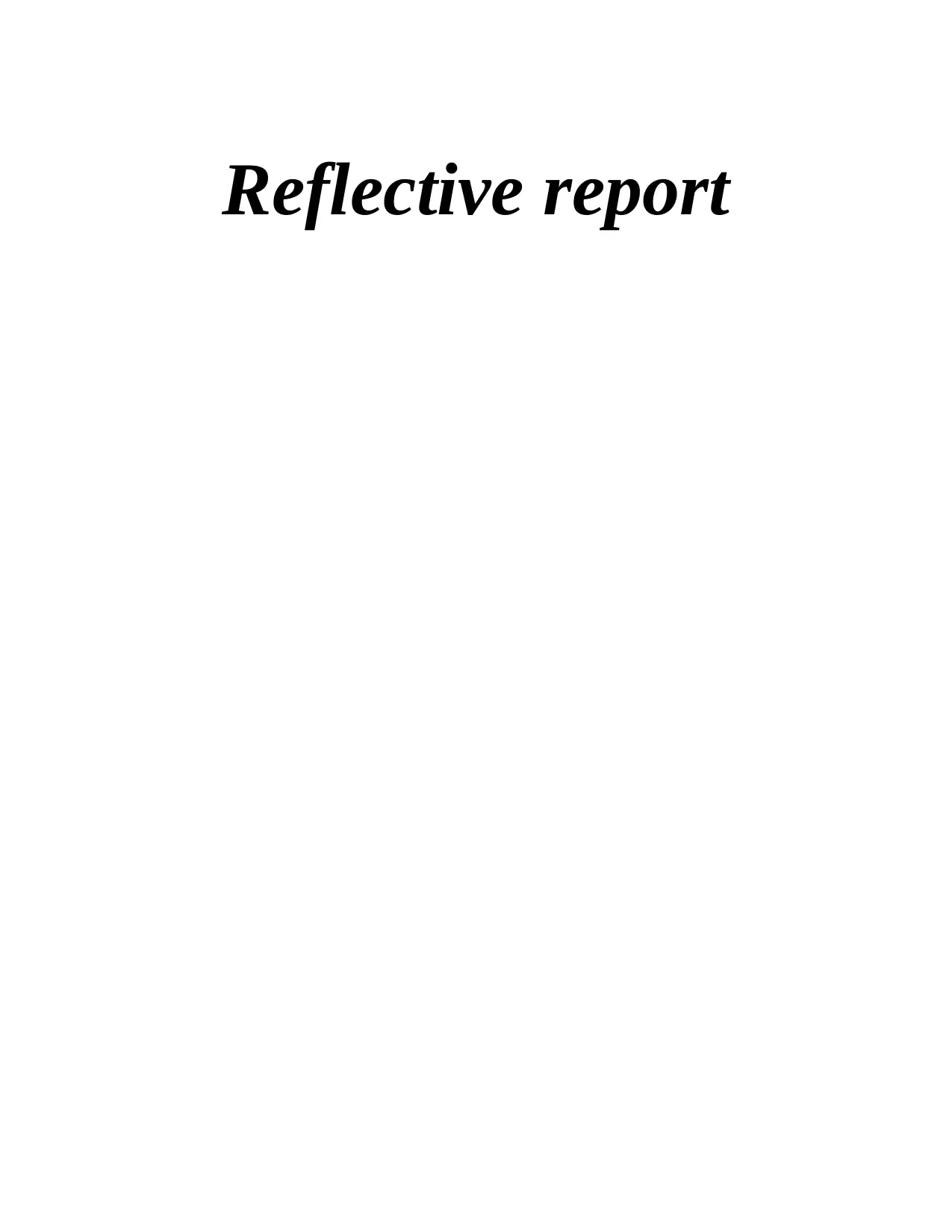
Reflective report
Paraphrase This Document
Need a fresh take? Get an instant paraphrase of this document with our AI Paraphraser
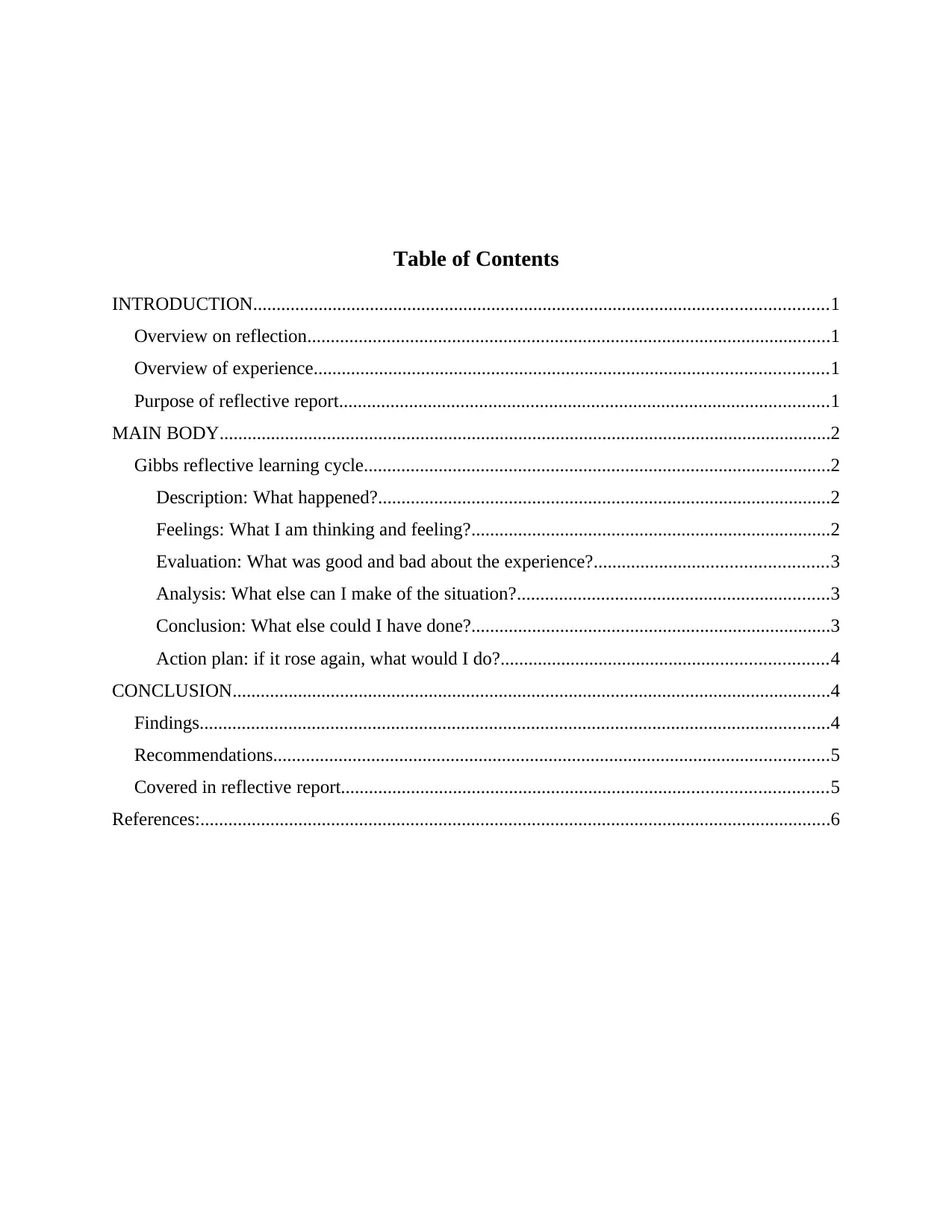
Table of Contents
INTRODUCTION...........................................................................................................................1
Overview on reflection................................................................................................................1
Overview of experience..............................................................................................................1
Purpose of reflective report.........................................................................................................1
MAIN BODY...................................................................................................................................2
Gibbs reflective learning cycle....................................................................................................2
Description: What happened?.................................................................................................2
Feelings: What I am thinking and feeling?.............................................................................2
Evaluation: What was good and bad about the experience?..................................................3
Analysis: What else can I make of the situation?...................................................................3
Conclusion: What else could I have done?.............................................................................3
Action plan: if it rose again, what would I do?......................................................................4
CONCLUSION................................................................................................................................4
Findings.......................................................................................................................................4
Recommendations.......................................................................................................................5
Covered in reflective report........................................................................................................5
References:.......................................................................................................................................6
INTRODUCTION...........................................................................................................................1
Overview on reflection................................................................................................................1
Overview of experience..............................................................................................................1
Purpose of reflective report.........................................................................................................1
MAIN BODY...................................................................................................................................2
Gibbs reflective learning cycle....................................................................................................2
Description: What happened?.................................................................................................2
Feelings: What I am thinking and feeling?.............................................................................2
Evaluation: What was good and bad about the experience?..................................................3
Analysis: What else can I make of the situation?...................................................................3
Conclusion: What else could I have done?.............................................................................3
Action plan: if it rose again, what would I do?......................................................................4
CONCLUSION................................................................................................................................4
Findings.......................................................................................................................................4
Recommendations.......................................................................................................................5
Covered in reflective report........................................................................................................5
References:.......................................................................................................................................6
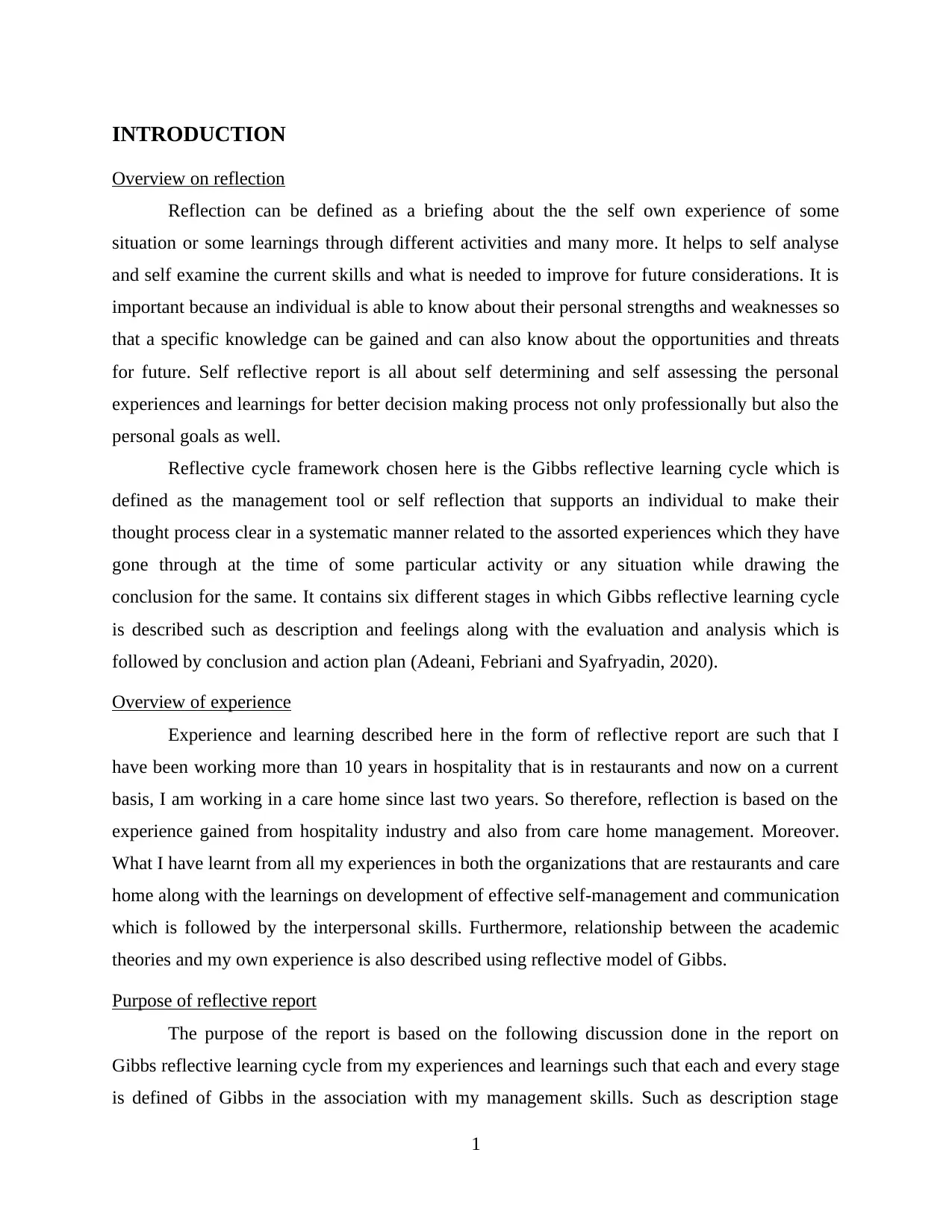
INTRODUCTION
Overview on reflection
Reflection can be defined as a briefing about the the self own experience of some
situation or some learnings through different activities and many more. It helps to self analyse
and self examine the current skills and what is needed to improve for future considerations. It is
important because an individual is able to know about their personal strengths and weaknesses so
that a specific knowledge can be gained and can also know about the opportunities and threats
for future. Self reflective report is all about self determining and self assessing the personal
experiences and learnings for better decision making process not only professionally but also the
personal goals as well.
Reflective cycle framework chosen here is the Gibbs reflective learning cycle which is
defined as the management tool or self reflection that supports an individual to make their
thought process clear in a systematic manner related to the assorted experiences which they have
gone through at the time of some particular activity or any situation while drawing the
conclusion for the same. It contains six different stages in which Gibbs reflective learning cycle
is described such as description and feelings along with the evaluation and analysis which is
followed by conclusion and action plan (Adeani, Febriani and Syafryadin, 2020).
Overview of experience
Experience and learning described here in the form of reflective report are such that I
have been working more than 10 years in hospitality that is in restaurants and now on a current
basis, I am working in a care home since last two years. So therefore, reflection is based on the
experience gained from hospitality industry and also from care home management. Moreover.
What I have learnt from all my experiences in both the organizations that are restaurants and care
home along with the learnings on development of effective self-management and communication
which is followed by the interpersonal skills. Furthermore, relationship between the academic
theories and my own experience is also described using reflective model of Gibbs.
Purpose of reflective report
The purpose of the report is based on the following discussion done in the report on
Gibbs reflective learning cycle from my experiences and learnings such that each and every stage
is defined of Gibbs in the association with my management skills. Such as description stage
1
Overview on reflection
Reflection can be defined as a briefing about the the self own experience of some
situation or some learnings through different activities and many more. It helps to self analyse
and self examine the current skills and what is needed to improve for future considerations. It is
important because an individual is able to know about their personal strengths and weaknesses so
that a specific knowledge can be gained and can also know about the opportunities and threats
for future. Self reflective report is all about self determining and self assessing the personal
experiences and learnings for better decision making process not only professionally but also the
personal goals as well.
Reflective cycle framework chosen here is the Gibbs reflective learning cycle which is
defined as the management tool or self reflection that supports an individual to make their
thought process clear in a systematic manner related to the assorted experiences which they have
gone through at the time of some particular activity or any situation while drawing the
conclusion for the same. It contains six different stages in which Gibbs reflective learning cycle
is described such as description and feelings along with the evaluation and analysis which is
followed by conclusion and action plan (Adeani, Febriani and Syafryadin, 2020).
Overview of experience
Experience and learning described here in the form of reflective report are such that I
have been working more than 10 years in hospitality that is in restaurants and now on a current
basis, I am working in a care home since last two years. So therefore, reflection is based on the
experience gained from hospitality industry and also from care home management. Moreover.
What I have learnt from all my experiences in both the organizations that are restaurants and care
home along with the learnings on development of effective self-management and communication
which is followed by the interpersonal skills. Furthermore, relationship between the academic
theories and my own experience is also described using reflective model of Gibbs.
Purpose of reflective report
The purpose of the report is based on the following discussion done in the report on
Gibbs reflective learning cycle from my experiences and learnings such that each and every stage
is defined of Gibbs in the association with my management skills. Such as description stage
1
⊘ This is a preview!⊘
Do you want full access?
Subscribe today to unlock all pages.

Trusted by 1+ million students worldwide
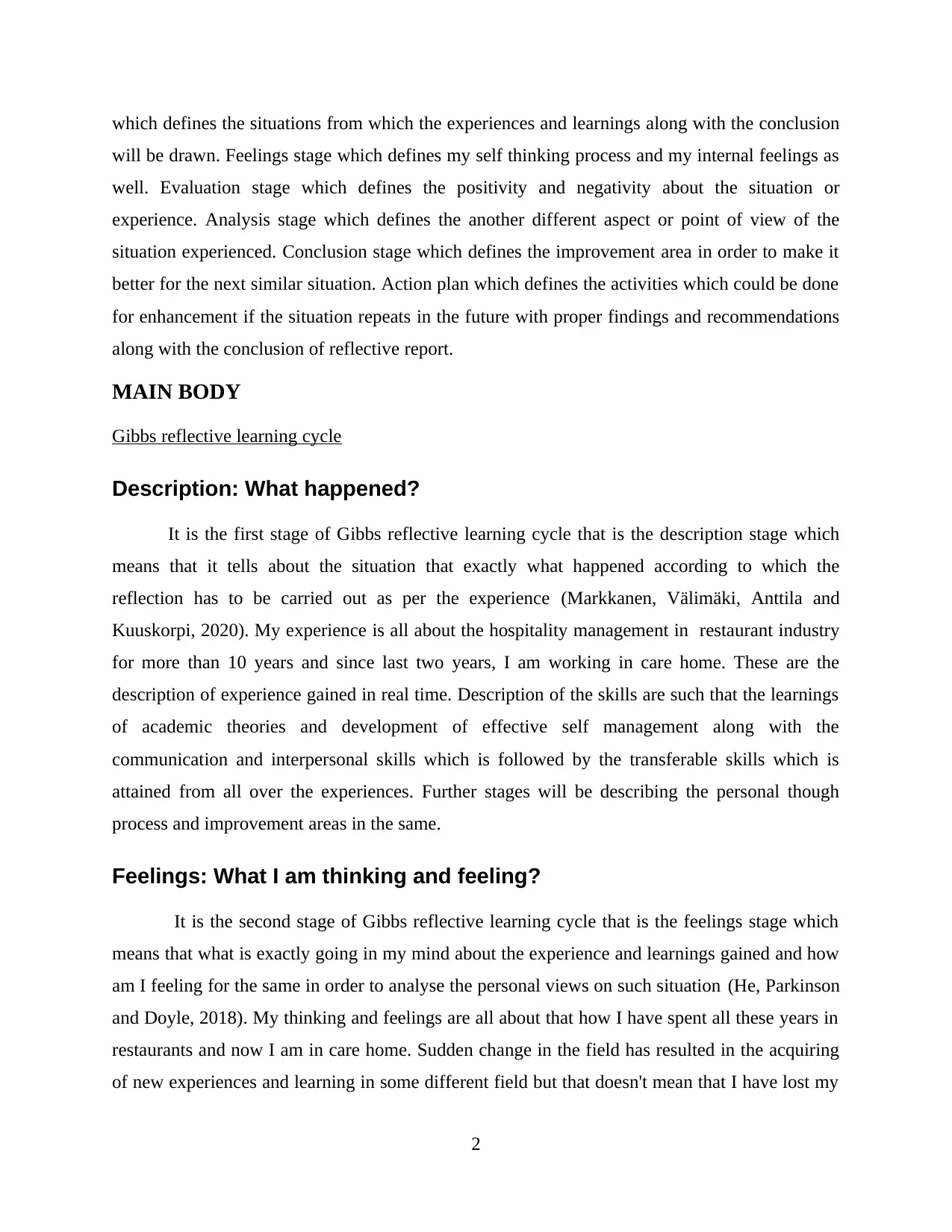
which defines the situations from which the experiences and learnings along with the conclusion
will be drawn. Feelings stage which defines my self thinking process and my internal feelings as
well. Evaluation stage which defines the positivity and negativity about the situation or
experience. Analysis stage which defines the another different aspect or point of view of the
situation experienced. Conclusion stage which defines the improvement area in order to make it
better for the next similar situation. Action plan which defines the activities which could be done
for enhancement if the situation repeats in the future with proper findings and recommendations
along with the conclusion of reflective report.
MAIN BODY
Gibbs reflective learning cycle
Description: What happened?
It is the first stage of Gibbs reflective learning cycle that is the description stage which
means that it tells about the situation that exactly what happened according to which the
reflection has to be carried out as per the experience (Markkanen, Välimäki, Anttila and
Kuuskorpi, 2020). My experience is all about the hospitality management in restaurant industry
for more than 10 years and since last two years, I am working in care home. These are the
description of experience gained in real time. Description of the skills are such that the learnings
of academic theories and development of effective self management along with the
communication and interpersonal skills which is followed by the transferable skills which is
attained from all over the experiences. Further stages will be describing the personal though
process and improvement areas in the same.
Feelings: What I am thinking and feeling?
It is the second stage of Gibbs reflective learning cycle that is the feelings stage which
means that what is exactly going in my mind about the experience and learnings gained and how
am I feeling for the same in order to analyse the personal views on such situation (He, Parkinson
and Doyle, 2018). My thinking and feelings are all about that how I have spent all these years in
restaurants and now I am in care home. Sudden change in the field has resulted in the acquiring
of new experiences and learning in some different field but that doesn't mean that I have lost my
2
will be drawn. Feelings stage which defines my self thinking process and my internal feelings as
well. Evaluation stage which defines the positivity and negativity about the situation or
experience. Analysis stage which defines the another different aspect or point of view of the
situation experienced. Conclusion stage which defines the improvement area in order to make it
better for the next similar situation. Action plan which defines the activities which could be done
for enhancement if the situation repeats in the future with proper findings and recommendations
along with the conclusion of reflective report.
MAIN BODY
Gibbs reflective learning cycle
Description: What happened?
It is the first stage of Gibbs reflective learning cycle that is the description stage which
means that it tells about the situation that exactly what happened according to which the
reflection has to be carried out as per the experience (Markkanen, Välimäki, Anttila and
Kuuskorpi, 2020). My experience is all about the hospitality management in restaurant industry
for more than 10 years and since last two years, I am working in care home. These are the
description of experience gained in real time. Description of the skills are such that the learnings
of academic theories and development of effective self management along with the
communication and interpersonal skills which is followed by the transferable skills which is
attained from all over the experiences. Further stages will be describing the personal though
process and improvement areas in the same.
Feelings: What I am thinking and feeling?
It is the second stage of Gibbs reflective learning cycle that is the feelings stage which
means that what is exactly going in my mind about the experience and learnings gained and how
am I feeling for the same in order to analyse the personal views on such situation (He, Parkinson
and Doyle, 2018). My thinking and feelings are all about that how I have spent all these years in
restaurants and now I am in care home. Sudden change in the field has resulted in the acquiring
of new experiences and learning in some different field but that doesn't mean that I have lost my
2
Paraphrase This Document
Need a fresh take? Get an instant paraphrase of this document with our AI Paraphraser

learnings from my restaurant field. Both the domains are different, I have learnt variety of things
in management in hospitality industry and the same thing happened in the care home
management as well.
Evaluation: What was good and bad about the experience?
It is the third stage of Gibbs reflective learning cycle that is the evaluation stage which
means that every situation has two aspects just like a coin have two definite faces, that is good or
positive points and bad or negative points which describes the experience as a whole (Pitts,
2021). My own self perception about the good and bad aspects in the situation are such that all
these years of restaurants and care home have given me both the experiences and learnings in the
form of positive and negative manner. Some days spent bad and some good. When there is a
work load then everything goes messed up but managed any how and when there is a normal day
then everything goes smooth. Although there can be good and bad experiences but learnings
cannot be bad because I have learnt from every situation that is one or the other thing which
helped me to manage the future similar situations.
Analysis: What else can I make of the situation?
It is the fourth stage of Gibbs reflective learning cycle that is the analysis stage which
means that what can be the different perception of the situation that can help an individual to
take it in an effective and efficient manner so that something innovative and creative can be
extracted out from it (Tanaka, Okamoto and Koide, 2018). I have made my thought process of
not only in a situation it appears but also seen the situation in different manner so that any
problem or difficulty arises while gaining the experience can be smooth going without any
hindrances which has helped me gaining the skills of management and moreover to stay positive
in every problematic situation. This is because tough times teaches more than the good times so
that I realised that I have to change my point of view to see the things in order to have my
experience more strategic in management terms.
Conclusion: What else could I have done?
It is the fifth stage of Gibbs reflective learning cycle that is the conclusion stage which
means that the strategies adopted to face the situation in the first time cannot be perfect and
3
in management in hospitality industry and the same thing happened in the care home
management as well.
Evaluation: What was good and bad about the experience?
It is the third stage of Gibbs reflective learning cycle that is the evaluation stage which
means that every situation has two aspects just like a coin have two definite faces, that is good or
positive points and bad or negative points which describes the experience as a whole (Pitts,
2021). My own self perception about the good and bad aspects in the situation are such that all
these years of restaurants and care home have given me both the experiences and learnings in the
form of positive and negative manner. Some days spent bad and some good. When there is a
work load then everything goes messed up but managed any how and when there is a normal day
then everything goes smooth. Although there can be good and bad experiences but learnings
cannot be bad because I have learnt from every situation that is one or the other thing which
helped me to manage the future similar situations.
Analysis: What else can I make of the situation?
It is the fourth stage of Gibbs reflective learning cycle that is the analysis stage which
means that what can be the different perception of the situation that can help an individual to
take it in an effective and efficient manner so that something innovative and creative can be
extracted out from it (Tanaka, Okamoto and Koide, 2018). I have made my thought process of
not only in a situation it appears but also seen the situation in different manner so that any
problem or difficulty arises while gaining the experience can be smooth going without any
hindrances which has helped me gaining the skills of management and moreover to stay positive
in every problematic situation. This is because tough times teaches more than the good times so
that I realised that I have to change my point of view to see the things in order to have my
experience more strategic in management terms.
Conclusion: What else could I have done?
It is the fifth stage of Gibbs reflective learning cycle that is the conclusion stage which
means that the strategies adopted to face the situation in the first time cannot be perfect and
3
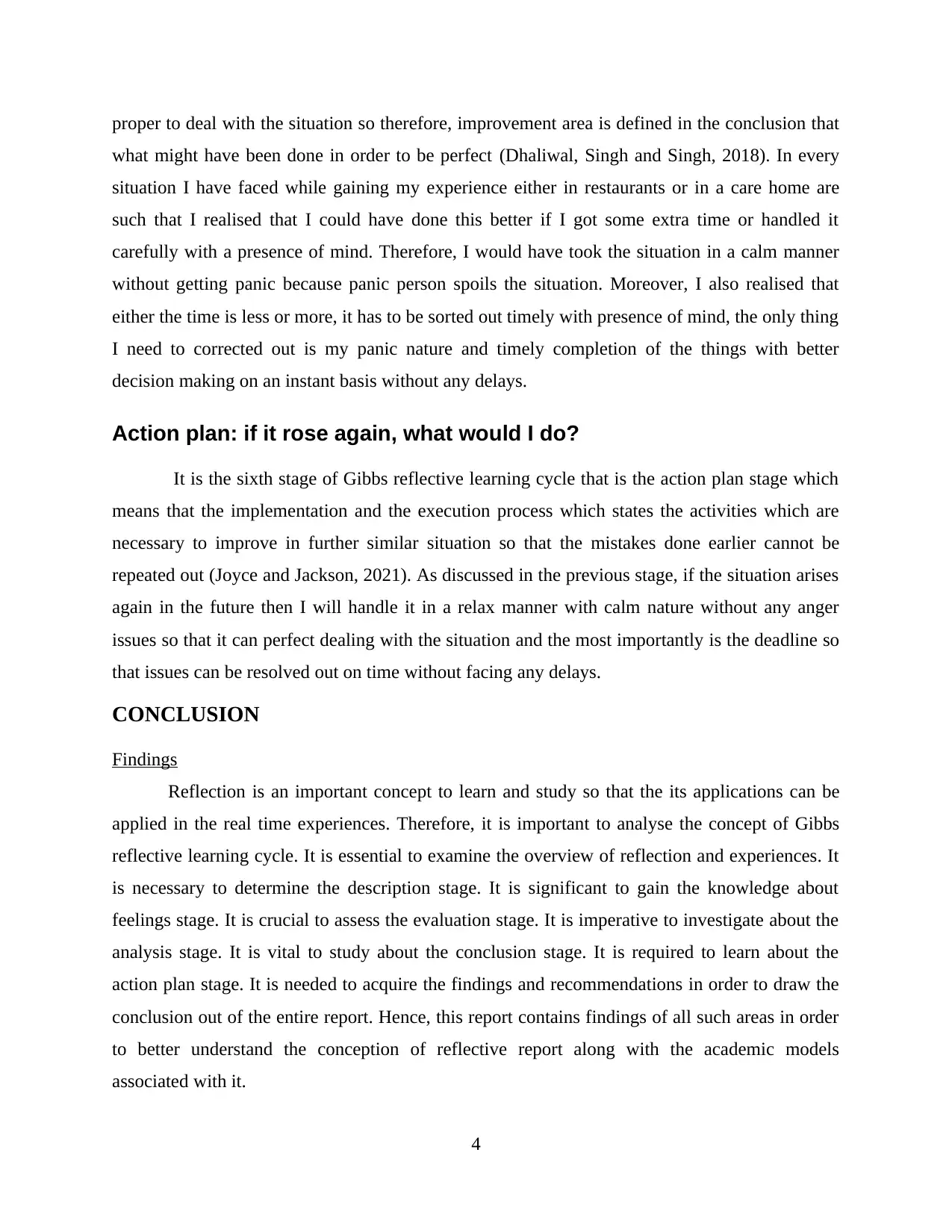
proper to deal with the situation so therefore, improvement area is defined in the conclusion that
what might have been done in order to be perfect (Dhaliwal, Singh and Singh, 2018). In every
situation I have faced while gaining my experience either in restaurants or in a care home are
such that I realised that I could have done this better if I got some extra time or handled it
carefully with a presence of mind. Therefore, I would have took the situation in a calm manner
without getting panic because panic person spoils the situation. Moreover, I also realised that
either the time is less or more, it has to be sorted out timely with presence of mind, the only thing
I need to corrected out is my panic nature and timely completion of the things with better
decision making on an instant basis without any delays.
Action plan: if it rose again, what would I do?
It is the sixth stage of Gibbs reflective learning cycle that is the action plan stage which
means that the implementation and the execution process which states the activities which are
necessary to improve in further similar situation so that the mistakes done earlier cannot be
repeated out (Joyce and Jackson, 2021). As discussed in the previous stage, if the situation arises
again in the future then I will handle it in a relax manner with calm nature without any anger
issues so that it can perfect dealing with the situation and the most importantly is the deadline so
that issues can be resolved out on time without facing any delays.
CONCLUSION
Findings
Reflection is an important concept to learn and study so that the its applications can be
applied in the real time experiences. Therefore, it is important to analyse the concept of Gibbs
reflective learning cycle. It is essential to examine the overview of reflection and experiences. It
is necessary to determine the description stage. It is significant to gain the knowledge about
feelings stage. It is crucial to assess the evaluation stage. It is imperative to investigate about the
analysis stage. It is vital to study about the conclusion stage. It is required to learn about the
action plan stage. It is needed to acquire the findings and recommendations in order to draw the
conclusion out of the entire report. Hence, this report contains findings of all such areas in order
to better understand the conception of reflective report along with the academic models
associated with it.
4
what might have been done in order to be perfect (Dhaliwal, Singh and Singh, 2018). In every
situation I have faced while gaining my experience either in restaurants or in a care home are
such that I realised that I could have done this better if I got some extra time or handled it
carefully with a presence of mind. Therefore, I would have took the situation in a calm manner
without getting panic because panic person spoils the situation. Moreover, I also realised that
either the time is less or more, it has to be sorted out timely with presence of mind, the only thing
I need to corrected out is my panic nature and timely completion of the things with better
decision making on an instant basis without any delays.
Action plan: if it rose again, what would I do?
It is the sixth stage of Gibbs reflective learning cycle that is the action plan stage which
means that the implementation and the execution process which states the activities which are
necessary to improve in further similar situation so that the mistakes done earlier cannot be
repeated out (Joyce and Jackson, 2021). As discussed in the previous stage, if the situation arises
again in the future then I will handle it in a relax manner with calm nature without any anger
issues so that it can perfect dealing with the situation and the most importantly is the deadline so
that issues can be resolved out on time without facing any delays.
CONCLUSION
Findings
Reflection is an important concept to learn and study so that the its applications can be
applied in the real time experiences. Therefore, it is important to analyse the concept of Gibbs
reflective learning cycle. It is essential to examine the overview of reflection and experiences. It
is necessary to determine the description stage. It is significant to gain the knowledge about
feelings stage. It is crucial to assess the evaluation stage. It is imperative to investigate about the
analysis stage. It is vital to study about the conclusion stage. It is required to learn about the
action plan stage. It is needed to acquire the findings and recommendations in order to draw the
conclusion out of the entire report. Hence, this report contains findings of all such areas in order
to better understand the conception of reflective report along with the academic models
associated with it.
4
⊘ This is a preview!⊘
Do you want full access?
Subscribe today to unlock all pages.

Trusted by 1+ million students worldwide
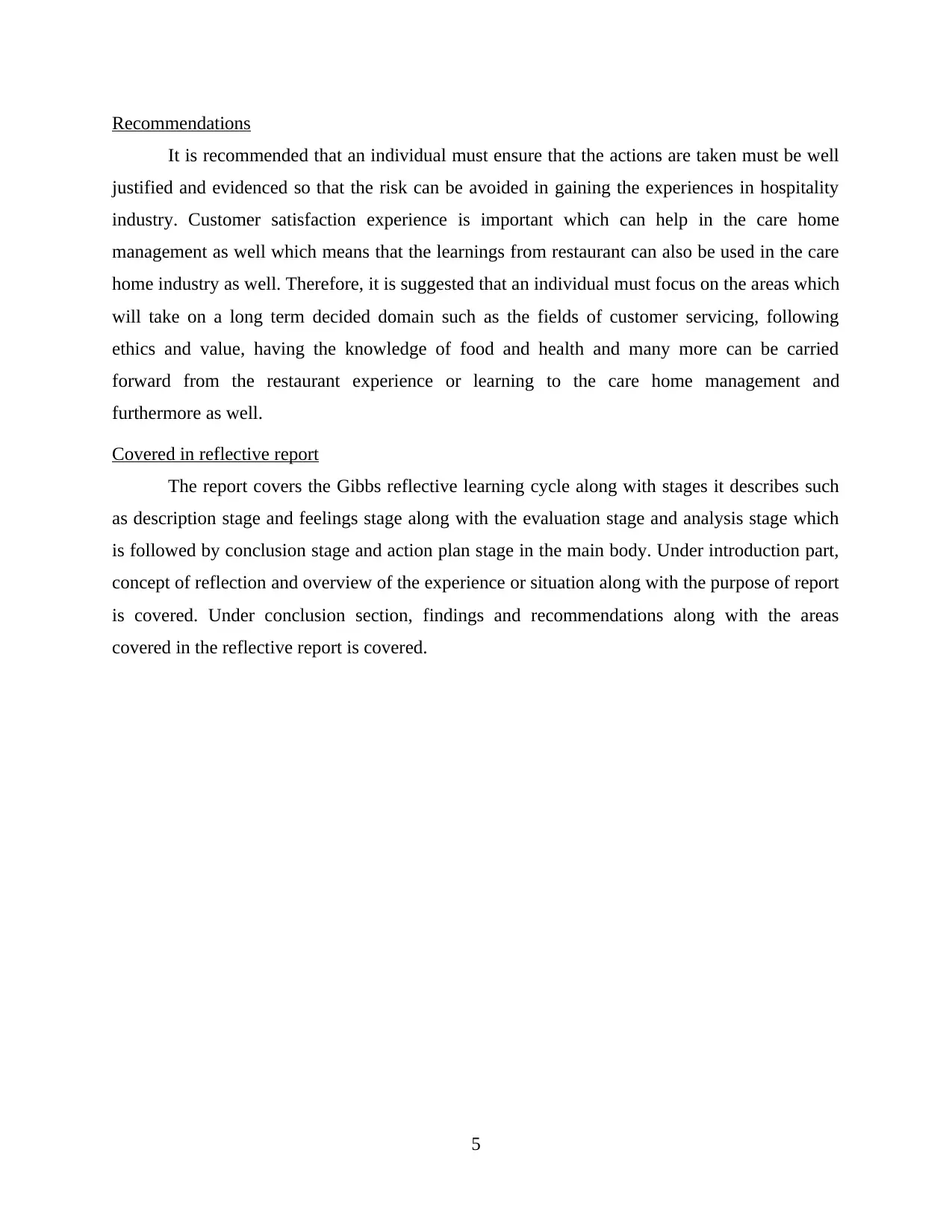
Recommendations
It is recommended that an individual must ensure that the actions are taken must be well
justified and evidenced so that the risk can be avoided in gaining the experiences in hospitality
industry. Customer satisfaction experience is important which can help in the care home
management as well which means that the learnings from restaurant can also be used in the care
home industry as well. Therefore, it is suggested that an individual must focus on the areas which
will take on a long term decided domain such as the fields of customer servicing, following
ethics and value, having the knowledge of food and health and many more can be carried
forward from the restaurant experience or learning to the care home management and
furthermore as well.
Covered in reflective report
The report covers the Gibbs reflective learning cycle along with stages it describes such
as description stage and feelings stage along with the evaluation stage and analysis stage which
is followed by conclusion stage and action plan stage in the main body. Under introduction part,
concept of reflection and overview of the experience or situation along with the purpose of report
is covered. Under conclusion section, findings and recommendations along with the areas
covered in the reflective report is covered.
5
It is recommended that an individual must ensure that the actions are taken must be well
justified and evidenced so that the risk can be avoided in gaining the experiences in hospitality
industry. Customer satisfaction experience is important which can help in the care home
management as well which means that the learnings from restaurant can also be used in the care
home industry as well. Therefore, it is suggested that an individual must focus on the areas which
will take on a long term decided domain such as the fields of customer servicing, following
ethics and value, having the knowledge of food and health and many more can be carried
forward from the restaurant experience or learning to the care home management and
furthermore as well.
Covered in reflective report
The report covers the Gibbs reflective learning cycle along with stages it describes such
as description stage and feelings stage along with the evaluation stage and analysis stage which
is followed by conclusion stage and action plan stage in the main body. Under introduction part,
concept of reflection and overview of the experience or situation along with the purpose of report
is covered. Under conclusion section, findings and recommendations along with the areas
covered in the reflective report is covered.
5
Paraphrase This Document
Need a fresh take? Get an instant paraphrase of this document with our AI Paraphraser
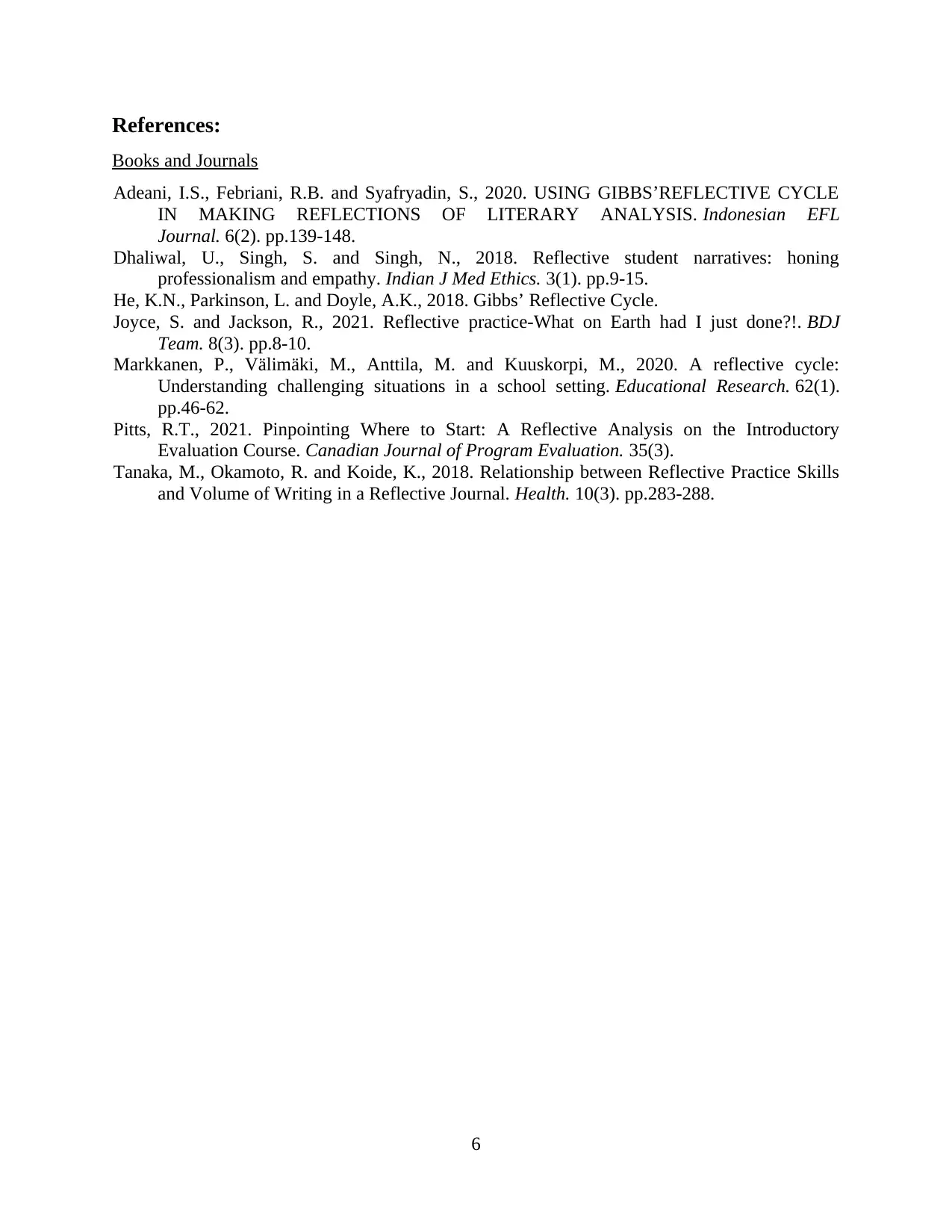
References:
Books and Journals
Adeani, I.S., Febriani, R.B. and Syafryadin, S., 2020. USING GIBBS’REFLECTIVE CYCLE
IN MAKING REFLECTIONS OF LITERARY ANALYSIS. Indonesian EFL
Journal. 6(2). pp.139-148.
Dhaliwal, U., Singh, S. and Singh, N., 2018. Reflective student narratives: honing
professionalism and empathy. Indian J Med Ethics. 3(1). pp.9-15.
He, K.N., Parkinson, L. and Doyle, A.K., 2018. Gibbs’ Reflective Cycle.
Joyce, S. and Jackson, R., 2021. Reflective practice-What on Earth had I just done?!. BDJ
Team. 8(3). pp.8-10.
Markkanen, P., Välimäki, M., Anttila, M. and Kuuskorpi, M., 2020. A reflective cycle:
Understanding challenging situations in a school setting. Educational Research. 62(1).
pp.46-62.
Pitts, R.T., 2021. Pinpointing Where to Start: A Reflective Analysis on the Introductory
Evaluation Course. Canadian Journal of Program Evaluation. 35(3).
Tanaka, M., Okamoto, R. and Koide, K., 2018. Relationship between Reflective Practice Skills
and Volume of Writing in a Reflective Journal. Health. 10(3). pp.283-288.
6
Books and Journals
Adeani, I.S., Febriani, R.B. and Syafryadin, S., 2020. USING GIBBS’REFLECTIVE CYCLE
IN MAKING REFLECTIONS OF LITERARY ANALYSIS. Indonesian EFL
Journal. 6(2). pp.139-148.
Dhaliwal, U., Singh, S. and Singh, N., 2018. Reflective student narratives: honing
professionalism and empathy. Indian J Med Ethics. 3(1). pp.9-15.
He, K.N., Parkinson, L. and Doyle, A.K., 2018. Gibbs’ Reflective Cycle.
Joyce, S. and Jackson, R., 2021. Reflective practice-What on Earth had I just done?!. BDJ
Team. 8(3). pp.8-10.
Markkanen, P., Välimäki, M., Anttila, M. and Kuuskorpi, M., 2020. A reflective cycle:
Understanding challenging situations in a school setting. Educational Research. 62(1).
pp.46-62.
Pitts, R.T., 2021. Pinpointing Where to Start: A Reflective Analysis on the Introductory
Evaluation Course. Canadian Journal of Program Evaluation. 35(3).
Tanaka, M., Okamoto, R. and Koide, K., 2018. Relationship between Reflective Practice Skills
and Volume of Writing in a Reflective Journal. Health. 10(3). pp.283-288.
6
1 out of 8
Related Documents
Your All-in-One AI-Powered Toolkit for Academic Success.
+13062052269
info@desklib.com
Available 24*7 on WhatsApp / Email
![[object Object]](/_next/static/media/star-bottom.7253800d.svg)
Unlock your academic potential
Copyright © 2020–2025 A2Z Services. All Rights Reserved. Developed and managed by ZUCOL.



